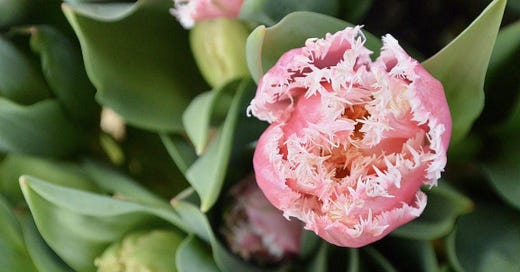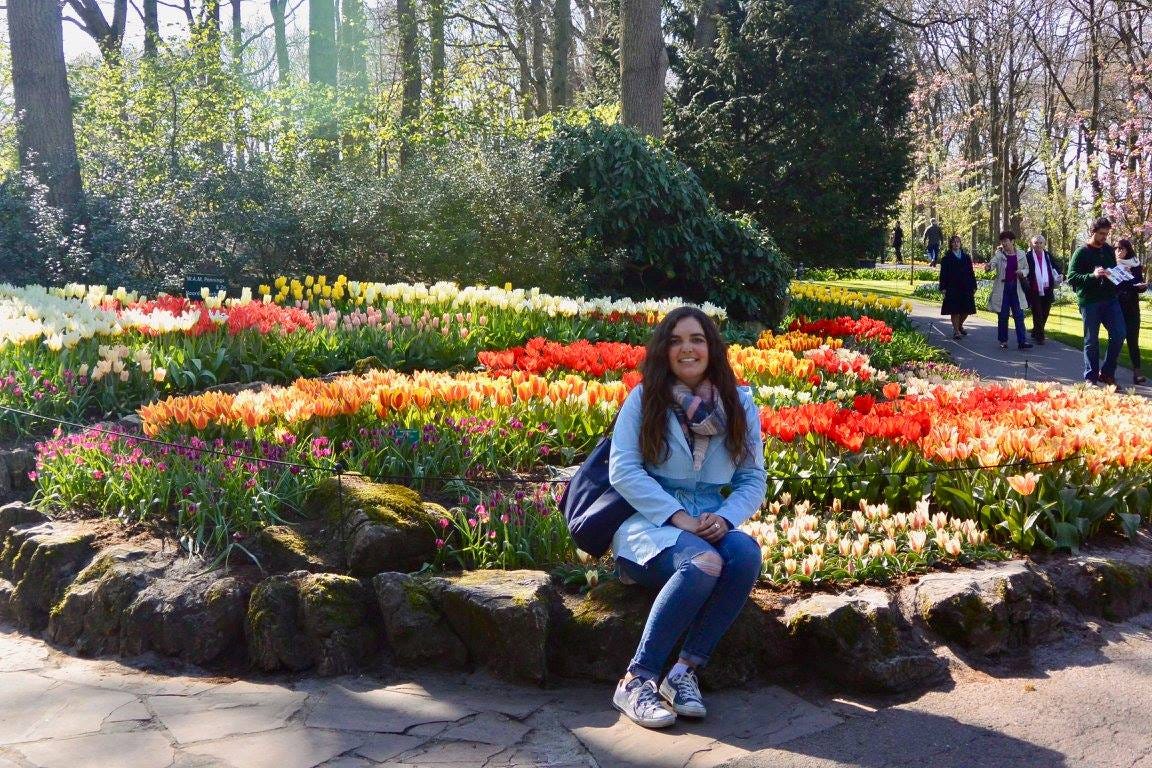Hello fellow learn-it-all,
Greetings from Chicago!
I recently realized that this is my first spring in Chicago. Last year, I was living in Michigan during the pandemic. I'm really looking forward to making the most of this warmer weather and getting back into running and biking. Maybe even swimming too, if some pools open up. I love reading outside in the parks, despite the allergist telling me I'm allergic to a multitude of different grasses.
If you are new here or missed last week's edition, you can catch up on the past letters here. If you are reading this for the first time, I’d love you to sign up below to join the other learn-it-alls:
Now, what's in store for this issue?
Some lessons from the OnDeck Course Creator Fellowship
A handful of takeaways from a book I started reading back during my Think Weekend
An essay idea for what I have rethought over the last decade
A pondering about writing your life's story
A word that is something I value in thought leaders I look up to
A quote from an Irish playwright on change
A question to get you thinking about what you think about. Yes I know, quite meta.
Some blooming flowers in one of my favorite countries
A shoutout to a fellow polymath
Now, let’s dive into letter 56 from a learn-it-all. Enjoy!
🧑🏫 On Deck Course Creator fellowship
I completed week one of the fellowship. Some highlights of notes on student and teacher mindsets are:
“Learning isn’t the transfer of knowledge. it’s the transformation of the student.” -Andrew Barry
Students need to trust you to be ready to go on a learning journey with you.
"Truly transformational learning occurs only when people are striving to accomplish something that matters deeply to them." - Peter Senge
The three steps of the fundamental principals when building a course are:
Reflect: Identify and write down your existing assumptions.
Deconstruct: Break down the problem into its fundamental truths.
Reconstruct: Build new solutions using the first principles.
📖 Reading
I finally finished up reading Think Again by Adam Grant. I preordered his book back in October and have been reading it a glacial speed to connect the concepts to my prior knowledge. I can see myself rereading this book again in 2021.
Without writing a whole book to summarize the book, here are a few of my favorite things:
Favorite exercises
To instill intellectual humility (knowing what you don't know), make a long list of areas where you are ignorant. This allows you to recognize any shortcomings and open the doors to doubt. It simultaneously allows us to become curious about the information we're missing. To scratch the surface of this list myself:
Life outside of the continents of North America and Europe, fashion, why allergies exist, wars apart from WWII, and why it's impossible to tickle ourselves.
Permanent marker into your calendar career check-ins, like your 6-month teeth cleaning at the dentist. Ask yourself:
When did you form the aspiration you're currently pursuing and how have you changed since then?
Have you reached a learning plateau in your role or workplace and is it time to consider a pivot to avoid identity foreclosure?
Favorite model
Four different modes of thinking we fall into based on our profession:
The ideal to lean towards in life is to be a scientist.
Favorite takeaways
Our conviction can lock us in prisons of our own making.
We must all build a challenge network full of individuals who have dissimilar traits and backgrounds but similar principles. They have a diversity of personality and experience while sharing values to promote commitment and collaboration.
Inquiry-based learning requires inspecting, investigating, interrogating, and interpreting. It allows students to realize that knowledge can evolve and not to always consume what text-books say as 100% fact. To do this think like a fact-checker:
Interrogate information instead of simple consuming. Active reading > passive reading.
Reject rank and popularity as a proxy for reliability. Quality knowledge can be underreported and not be on the NYT list.
Understand that the sender of information is often not its source. Have a lens of skepticism in translation.
Favorite quote
“If knowledge is power, knowing what we don’t know is wisdom.” –Adam Grant
Favorite question to ponder
To figure out if your work is meaningful ask: If this job didn't exist, how much worse off would people be?
Favorite coined phrases
Fat-cat syndrome: resting on our laurels instead of pressure testing our beliefs
Armchair quarterback syndrome: someone blind to their weaknesses, with failure to admit mistakes, and exuding confidence over nonexistent competence
Favorite word
Blirtatiousness: A combination of blurting and flirting. A measure of how "loose and fast" you are when communicating with other people. In other words, do you blurt out?
Example: they will respond more quickly to an obnoxious phone call or to personal insults. However, they are perceived by others to be more likable and competent!
Favorite writing style from Grant
When he inserted nerdy jokes in italicized text from his own persona experiences of when he messed up as well while rethinking showing his human side. You best believe I was drawing smiley faces and writing LOL all over my marginalia.
🖊 Writing
When reading Think Again, it got me thinking reflectively about what I've rethought in my years. Here's a laundry list of a some things I've changed my mind on over the last decade:
2011: Teachers in public school don't know which Jennifer I am, so I need to put my last name on my tests.
2012: Dropping down from Honors math to college prep doesn't mean I'm stupid. I just wasn't passing by on the accelerated track.
2013: I don't need to rely on a teacher to learn to drive stick shift. I can watch hours of YouTube videos.
2014: Asking guys to Sadie Hawkins or Prom isn't actually the end of the world. You survive. It helps when you ask your coolest AP Bio teacher ever who helps out and ask on your behalf in front of the whole class whiteboard.
2015: Just because I didn't make the cut for the lacrosse team doesn't mean I shouldn't join the swim team.
2016: America has progressed its rights for women especially when compared to the third world country like Fiji who live in villages and do not attend past primary education.
2017: Direct Dutch strangers aren't friendly while asked "How are you?" Defer to talking about the weather instead.
2018: Being dyslexic does not mean I cannot be a reader or a writer. It was my fixed mindset.
2019: Writing online is more important than trying to publish a book.
2020: I can start my own business and don't need a hierarchy within a company to develop my professional career trajectory. Also, Internet friends are the best thing since sliced bread.
2021: To be an expert learner, you need to be a teacher and a student simultaneously.
Inspired by one of my heroes Adam Grant, I'm going to write an essay more cohesively about things I've change my mind on. If you have ideas of how to converge these divergent ideas, let me know. I appreciate more than you know if you hit reply to this email.
💭 Pondering
How can we be more intentional about the characters, events, and locations that make up our life story. It's up to our own choices to decide how much of the plot will be dominated by one definition of home, person, or version of success. That is incredibly empowering, while also freakishly terrifying.
🔎 Word to define
Humility: the state or quality of being humble.
Freedom from pride and arrogance; lowliness of mind; a modest estimate of one's own worth; a sense of one's own unworthiness through imperfection and sinfulness; self-abasement; humbleness.
Having or showing a modest or low estimate of one's own importance. A similar phrase is using my humble abode. It refers to one's home with an ironic or humorous show of modesty or humility.
Etymology: Middle English: from Old French humilite, from Latin humilitas, ‘low, lowly’, from humus ‘ground’.
Example: Humans have a competitive advantage in future of work against machines because we are less robotic and can show humility towards one another with our mistakes.
🌟 Quote to inspire
"Progress is impossible without change; and those who cannot change their minds cannot change anything." –George Bernard Shaw
❓ Question to think about
What have you rethought during these beginning months of 2021?
📷 Photos of the Week
I haven't taken nearly enough photos yet this spring of the blooming flowers. For now, these from the Keukenhof circa 2017 will suffice. What did I just say? The Keukenhof in layman's terms is described in the Netherlands as "the most beautiful spring garden in the world". It is also known as the Garden of Europe.
According to the official website, Keukenhof Park covers an area of 32 hectares and approximately 7 million flower bulbs are planted in the gardens annually. I visited with my brother Mitch when he was visiting me for two weeks in 2017. I'd never seen so many tulips in my life. They are, to this day, my favorite flower.
Fun fact: The tulip bubble happened during the Golden Age in the Netherlands in 1636. It meant that there was a frenzy for the flower that created outrageous prices for exotic flower bulbs.
Thought experiment: which of these next two photos resonate with you more?
For me, it’s the first one. I’ve always seen myself as a late bloomer. I got my growth spurt last in middle school, so I never got to be a setter on the volleyball team. I chose my major last in college. I took a break from corporate America before entering the “real world” after college. Don’t get me wrong that I have a competitive nature, but I don’t get the point of racing especially when certain things are out of your control or if it’s to live up to the blind expectations of others.
What’s wrong with being a tortoise who is racing their own competition. Slow and steady. I'd say that's a slogan for my life, as long I finish what I set out to do, I'm proud.
🙏 Shoutouts
To Adam Grant for being so funny and being one of my favorite teachers
To my friend Salman Ansari, author of Quick Brown Fox, who is launching a new virtual session on embracing a polymath life: The Polymath Advantage. He’ll be talking about how specialization can be problematic, and how building cross-disciplinary mental models can help you differentiate.
I appreciate you reading this! If certain ideas resonated or you have feedback to improve my future newsletters, I’d love you to leave a comment, reply to this email, or send me a message on Twitter @JenVermet.
Never stop learning 😁
Until next week,
Jen
P.S. if you're interested in some inspiration about charting the path less traveled, look here.
If you’re reading this because someone shared this newsletter with you or you clicked a link somewhere, welcome! I’d love it if you subscribed below to receive future updates:










